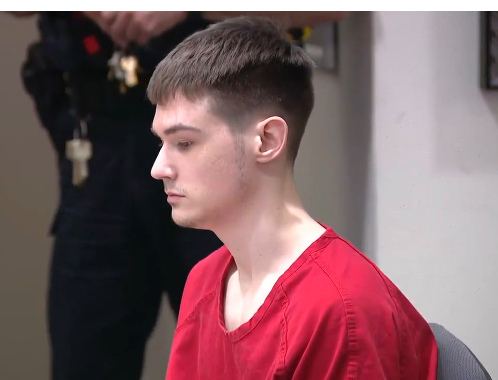Every individual who entered the courtroom was profoundly affected by Chase Jones’ sentencing, from the judge whose voice broke under the weight of the tragedy to the distraught family members. Jones was sentenced to 17.5 years in prison at the age of nineteen for causing a high-speed collision in Renton that killed four people, including a mother and three children. In an especially heartbreaking detail, two additional kids sustained serious injuries and are currently dealing with physical and mental difficulties for the rest of their lives. The recurrent implication that the events might have been avoidable was what made the case so emotionally charged, not just the sheer number of fatalities.

The topic of Jones’ parents’ involvement has come up in recent months because court documents show that he had caused the deaths of two other cars in the year prior to the fatal collision. His parents showed up before police in both previous incidents, according to legal observers, a detail that has stoked public rumors. Parents who intentionally permit an unsafe driver to operate their vehicle may be held civilly liable under laws pertaining to negligent entrustment. Many wonder if earlier intervention could have changed the outcome, and the purported ownership of the Audi used in the fatal crash becomes a point of particular interest in this context.
| Name | Chase Jones |
|---|---|
| Age | 19 (at time of sentencing) |
| Birthplace | Washington, U.S. |
| Incident Date | March 19, 2024 |
| Location of Crash | Renton, Washington |
| Victims | Andrea Hudson (38), Matilda Wilcoxson (13), Eloise Wilcoxson (12), Boyd “Buster” Brown (12) |
| Survivors | Two children (critically injured) |
| Vehicle Driven | Audi (allegedly linked to parents’ ownership) |
| Sentence | 17.5 years in prison |
| Reference |
Family members of the victims expressed their sorrow during the sentencing hearing with remarkable clarity. Abe, the husband of Andrea Hudson, said it was the moment when all of their dreams came crashing down. He described empty chairs at family get-togethers, quiet bedrooms, and the eerie lack of laughter. The testimony struck a deep chord not only because of its emotional impact but also because it served as a reminder of how one careless act can irrevocably change the lives of many people.
Jones read a statement expressing regret through his lawyer. However, a complex range of emotions reacted to his words. In a moment of extraordinary compassion, Andrea’s mother said she forgave him in order to find inner peace rather than to lessen the loss. The outrage expressed by those present, who feel that responsibility must go beyond the driver to those who may have permitted his actions, was a stark contrast to that sentiment.
Jones never tried to brake prior to impact, according to crash investigators. He ran a red light at 112 mph while keeping his throttle fully engaged, according to witnesses. The story was made even more disturbing by the fact that this was not an isolated incident but rather a part of a trend of reckless driving. Legal analysts saw it as a classic case that would inevitably raise issues of parental responsibility. The parents may have contributed to the tragedy, whether intentionally or unintentionally, by permitting access to a powerful vehicle in spite of prior collisions.
There are important societal ramifications. Although reckless driving by young drivers is not new, the stakes have significantly increased in a time when cars are more powerful and distractions are more common. The question of how much freedom to give a teenage driver and when to draw the line for safety is one that families nationwide must deal with. The consequences of blurring those lines are especially starkly illustrated by this case.
Similar arguments concerning accountability—how much a support network can impact someone’s path, whether by guiding them toward success or by failing to step in before calamity strikes—have been observed in the music and sports industries. In other high-profile cases, such as when celebrity entourages permitted intoxicated drivers to operate motor vehicles, leading to avoidable collisions, the legal notion of negligent entrustment has surfaced. These similarities demonstrate that the idea is a matter of collective responsibility and is not specific to any one group or population.
The sentence provided some closure for the families of the victims, but it did not provide any genuine relief. Milestones will still go unmarked, birthdays will still go by without candles, and the silence in their homes will still feel oppressively heavy. However, they regained a sense of agency by speaking candidly in court. Everyone in attendance was reminded by their testimonies and a video montage of happy faces and happy moments that the victims were more than just names in a court file; they were living people whose absence would be felt for decades.
Jones’ parents may face their own legal challenges in the upcoming months. Their decisions up until March 2024 could be examined in civil litigation, if it is pursued. Civil law can take a more comprehensive approach, examining how other people might have contributed to the sequence of events, whereas criminal law places the driver directly at fault. This is where the public discussion heats up: was this a tragedy that could have been prevented by firm parental intervention, or was it just a case of young irresponsibility going too far?
Outrage and empathy have been mixed together in the community’s multi-layered response. While some locals support more education and preventive measures, others demand harsher penalties for repeat offenders, particularly young drivers. Prevention is especially crucial because the results of a collision between speed, inexperience, and powerful cars are frequently irreversible. Many people are hoping that this case will teach parents to be more watchful, particularly when the warning signs are as obvious as they were in previous crashes.
The judge’s voice trembled as the last gavel fell during the sentencing, reflecting the room’s collective grief. Each person carried a fragment of the tragedy with them as the courtroom gradually emptied. Some saw the day as a celebration of justice, while others saw it as a chance to ensure that such destruction would never occur again. It is unclear if the discussion will result in legal repercussions for Jones’ parents, but the general lesson is very evident: accountability for protecting lives goes well beyond the driver’s seat.
